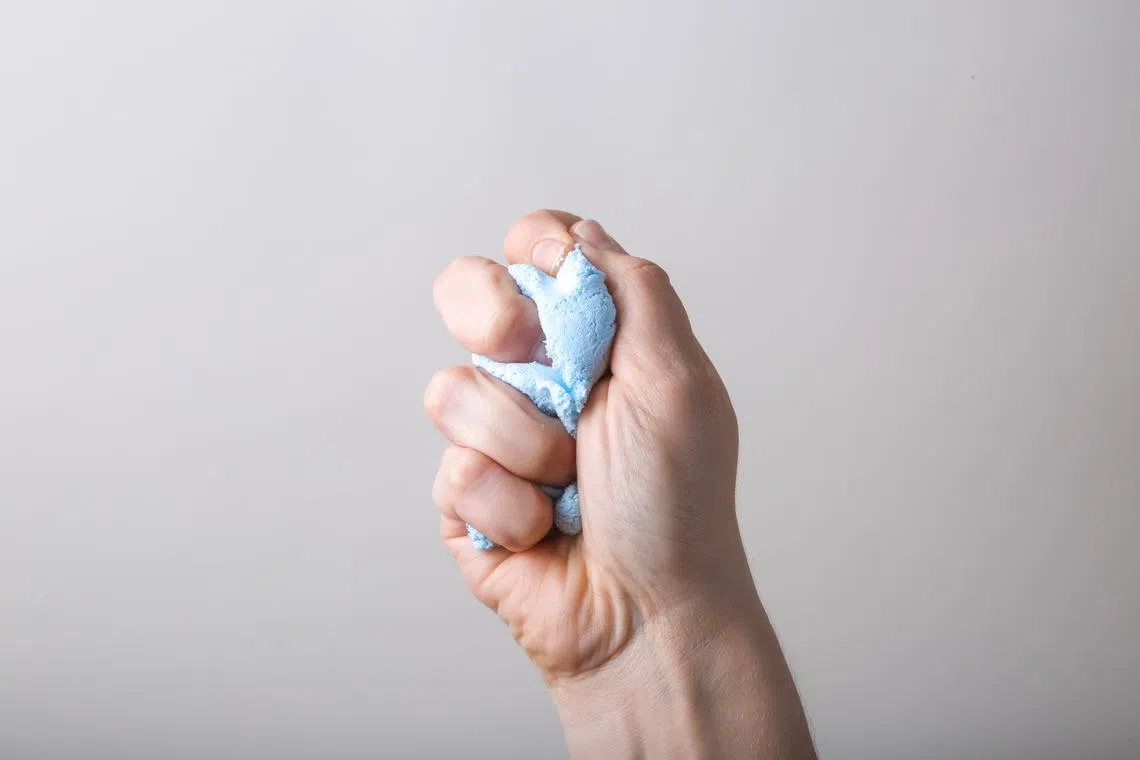Unusual for people with adjustment disorder to commit violent acts: Mental health experts
Sign up now: Get ST's newsletters delivered to your inbox

Someone with the disorder might feel sad, worry excessively and have difficulty concentrating.
PHOTO ILLUSTRATION: UNSPLASH
SINGAPORE – While those with adjustment disorder may experience difficulties going about their daily tasks, the impairment rarely leads to them turning violent, said mental health experts.
Dr Steve Lee, an associate consultant at the department of mood and anxiety at the Institute of Mental Health (IMH), said adjustment disorder is a psychological condition that occurs when an individual has difficulty coping with stressors or major life changes.
It is characterised by emotional and behavioural manifestations that develop after the start of the stressful event, and which significantly affect the person’s daily life functioning. Stressors include divorce, financial difficulties, interpersonal conflicts and physical health problems.
Someone with the disorder might feel sad, worry excessively and have difficulty concentrating. But most of them experience internal distress and do not turn aggressive, said Dr Lee.
“In rare cases, if the stressor leads to extreme distress and the individual lacks healthy coping mechanisms, there may be a small risk of aggressive behaviour. However, this is an atypical response and not a common outcome of adjustment disorder.”
David Brian Chow Kwok-Hun, who was convicted of culpable homicide and jailed for seven years
He had lost sleep and was overwhelmed with stress after he was given a set of unusually low financial figures by an employee.
Days after, he developed suicidal thoughts and hoped that by killing Ms Isabel Elizabeth Francis and their unborn daughter, they would “go to heaven” instead of suffering shame.
Chow’s defence lawyers said his condition led to catastrophic thinking, and severely impaired his rational judgment and ability to appreciate the nature and consequences of his actions.
Dr Lee said adjustment disorder is a relatively common mental health condition, adding that around 5 per cent to 20 per cent of people who seek mental health treatment worldwide may receive the diagnosis.
Dr Lim Boon Leng, a psychiatrist at Gleneagles Hospital, typically sees 10 patients a month with the disorder.
He said it is unusual for someone with the disorder to go to such extremes, but some behaviour can be unpredictable.
“When a person is labouring under mental health issues, their better judgment can be impaired. Their rationality may not be at 100 per cent, and sometimes they may adopt nihilistic perspectives (for example, extreme pessimism),” he added.
Compared with depression or anxiety, adjustment disorder is not a long-term psychiatric condition.
Consultant psychiatrist Brian Yeo, who runs a clinic at Mount Elizabeth Medical Centre, said: “Adjustment disorder is expected to be resolved within six months after the stressor is over. By definition, it is milder, short-lived and linked to stress.”
IMH’s Dr Lee said treatment usually involves short-term psychotherapy, which helps individuals develop healthy coping strategies, improve problem-solving skills and manage their emotions. In some cases, anti-depressants or anti-anxiety medication may be prescribed for a short duration to ease symptoms.
Dr Geraldine Tan, director and principal psychologist at The Therapy Room, said during therapy, psychologists work on their clients’ thinking process.
She added: “Sometimes they come and say: My life is over. We will work with them and ask: What do you mean your life is over? Let us look at it.
“We help them to look at things from a different perspective, to help them to understand that they have not lost control, and focus on what they can do about things.”
Once, she helped a young man who had adjustment disorder and was experiencing suicidal thoughts during his national service. He was eventually exempted from service, which brought relief to him. Dr Tan also redirected his thoughts to his plans for the future, such as going to university.
Those with loved ones showing symptoms of the disorder should seek help from medical professionals, said Dr Tan.
Dr Yeo said family members can help by resolving the specific stressor the person faces.
Amid his concerns, Chow was reassured by his family that his company was doing well and that they would be there for him.
His father made an appointment for him to see a psychiatrist the day of the incident, and had arranged to pick him up for work in the morning.
Dr Lim said the family did all the right things, but unfortunately not all tragedies can be prevented. Emphasising that mental health issues should not be taken lightly, Dr Lim added: “Usually, timely interventions will help.”
Helplines
Mental well-being
Institute of Mental Health’s Mental Health Helpline: 6389-2222 (24 hours)
Samaritans of Singapore: 1800-221-4444 (24 hours) /1-767 (24 hours)
Singapore Association for Mental Health: 1800-283-7019
Silver Ribbon Singapore: 6386-1928
Tinkle Friend: 1800-274-4788
Chat, Centre of Excellence for Youth Mental Health: 6493-6500/1
Women’s Helpline (Aware): 1800-777-5555 (weekdays, 10am to 6pm)
Aware’s Sexual Assault Care Centre: 6779-0282 (weekdays, 10am to 6pm)
National Anti-Violence and Sexual Harassment Helpline: 1800-777-0000
Counselling
TOUCHline (Counselling): 1800-377-2252
TOUCH Care Line (for seniors, caregivers): 6804-6555
Care Corner Counselling Centre: 6353-1180
Counselling and Care Centre: 6536-6366
Online resources
carey.carecorner.org.sg
(for those aged 13 to 25)limitless.sg/talk
(for those aged 12 to 25)


